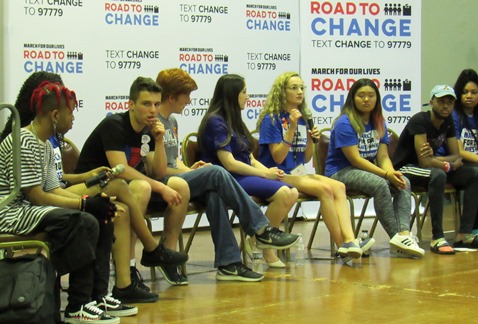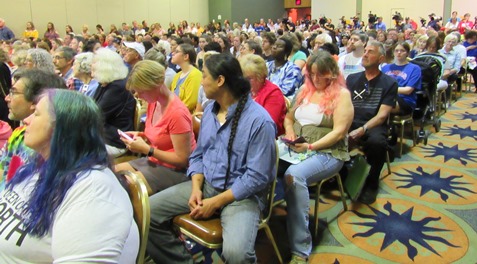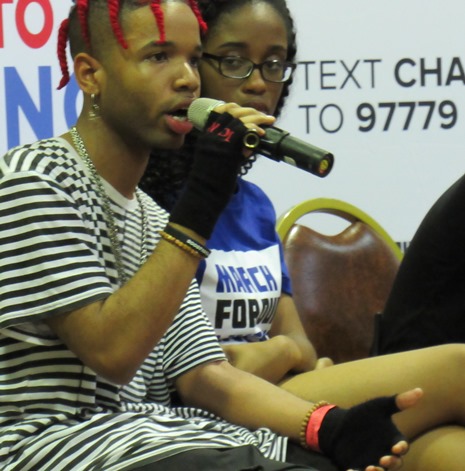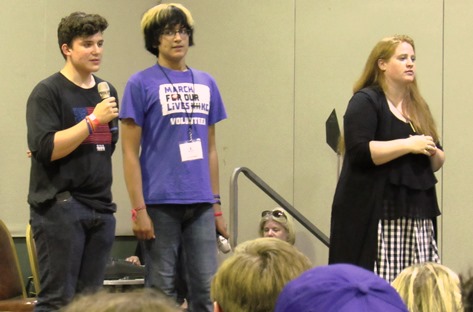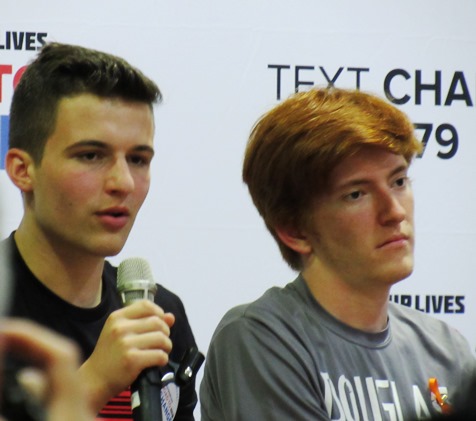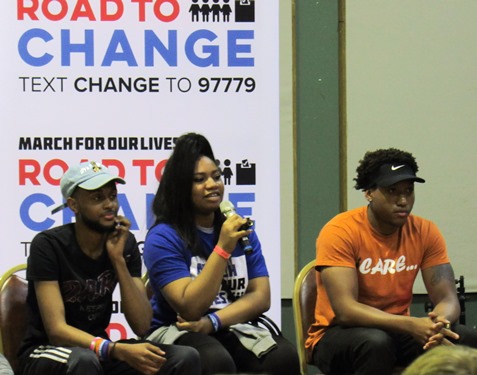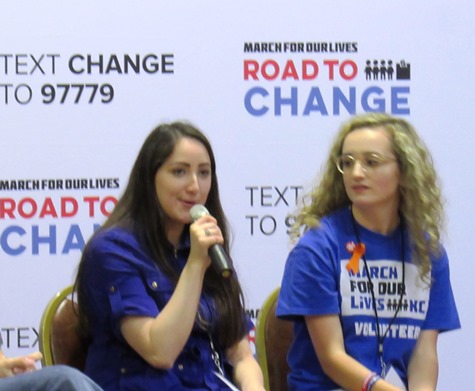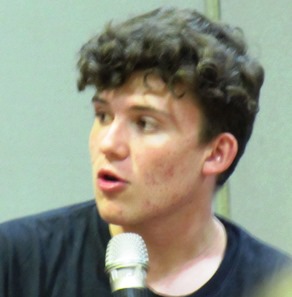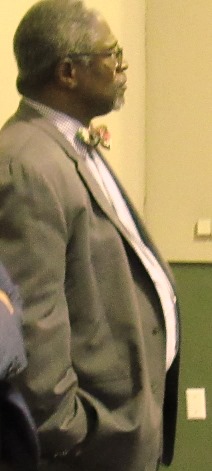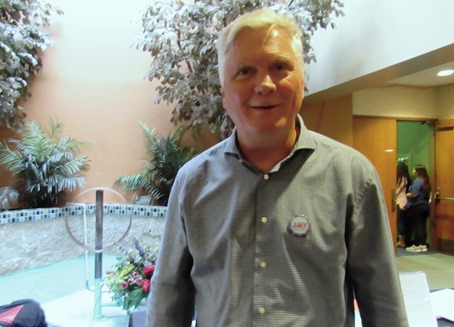by Celia Llopis-Jepsen, Kansas News Service
There’s a common thread among the campaigns of several men aspiring to replace Kansas Secretary of State Kris Kobach — promises of administrative competence.
So says Emporia State political scientist Michael Smith. It jumped out at him as he perused some of their websites.
“To me,” he said, it “has sort of a subtext, that that has not been Kobach’s focus.”
Take Olathe Republican Scott Schwab’s campaign ad. In a video scored with soothing piano music, Schwab rattles off a list of changes to Kansas election law that Kobach and state lawmakers like himself ushered in over the past several years.
“I would say it’s time now to just breathe,” the candidate tells viewers. “Take what we’ve got and let’s execute it at a high level. That way when you get the results after that primary or general election, you trust it.”
Schwab is one of six men who have stepped forward to fill Kobach’s shoes in an office that the secretary transformed from a relatively mundane post into a bully pulpit.
In an interview, Schwab said he’s offering a change in leadership style — a focus on supporting county election clerks and making sure their practices for counting ballots are consistent.
Under Kobach, he said, there were distractions. The result? Limited availability to those clerks.
“You know, Kris is running for governor,” said Schwab, a state lawmaker with a key leadership position in the House. “He’s been plagued by a lot of lawsuits. And he was very involved early on with the Trump administration.”
A higher office
Secretary of state has traditionally been more of an administrative job in Kansas. The office maintains databases and records on everything from voter registration to business startups.
Enter Kobach — a man with loud but unsubstantiated claims about rampant illegal voting, and national ambitions for his tough-on-immigration agenda. He broke the mold.
“Kobach has obviously been extremely controversial and ideological in how he has run the office,” University of Kansas political scientist Patrick Miller said. “That has highlighted the power and importance of this office.”
Since taking office in 2011, the Topeka native from a small Midwestern state has quite possibly become the country’s best known state-level secretary of state.
Within Kansas, he got his state to enact the country’s tightest voter registration requirements and bestow prosecutorial powers that no other other secretary of state had.
Nationally, Fox News features Kobach often. His fingerprints are on changes to the U.S. Census and, though he was technically vice chair, he led President Donald Trump’s short-lived voter fraud commission. Trump began making false claims that millions of illegal ballots cost him the 2016 popular vote soon after meeting with Kobach.
The newly elevated stature of the position may be why the race for secretary of state is so crowded this year. And it may reflect a national trend of these jobs gaining heft.
Miller calls it the “Katherine Harris” effect. Harris was the Florida secretary of state who landed in the spotlight when the 2000 presidential election between Al Gore and George W. Bush came down to the bitterly contested narrow ballot margin in her state.
“People started to notice that these offices exist and matter,” he said.
The next officeholder in Kansas will inherit some baggage along with the spotlight. Public scrutiny of the agency’s handling of sensitive data, for example. And federal lawsuits.
In April a judge held Kobach in contempt and last month scuttled Kansas’ voter registration requirements as unconstitutional. An appeal in the case is forthcoming.
The five-way primary
Next month’s Republican primary is the most contested for this position in at least three decades — though Kansas GOP chairman Kelly Arnold considers the jostling normal in this red state and a sign that his party is healthy.
“We have so many great candidates,” he said.
The challenge contenders face for an office like this one — even more so than, say, running for governor — is getting out their messages.
Advertising is expensive, says Arnold, and “it becomes difficult for candidates to fundraise for office when you are a down-ballot race.”
Last fall Arnold started a bid for Kobach’s job, too, then withdrew.
In addition to Schwab, who has worked in the insurance and pharmaceutical industries, state lawmaker Keith Esau is running. Esau is the House elections chairman and a software developer.
Other competition comes from attorney Dennis Taylor, who ran various state agencies under governors Mike Hayden and Sam Brownback; Craig McCullah, who served in the Army for more than a decade and worked for Kobach as a voter fraud investigator; and Randy Duncan, a former Saline County commissioner and longtime regional GOP leader.
In separate interviews, each touched on the themes of election security, sound office administration and improving the state’s business filing system.
But some think the office is in better shape than others do.
“If someone thinks the secretary of state is doing a good job,” Taylor said in an interview, “I’m probably not their guy.”
He suggested Kobach’s office should be taking the threat of hacking more seriously.
“Target. Sachs,” he said. “These companies thought they were invincible too — right up until the moment they weren’t.”
McCullah, whose duties under Kobach included overseeing IT, is more confident.
“I can tell you that Kansas has the safest, most secure elections in the nation,” he said.
The Democrat
Whoever wins in August will face off against the man who, in a sense, put Lawrence on the map — former Google vice president Brian McClendon.
“I made my childhood home, right there, the center of Google Earth,” he explains in a campaign video, standing outside the apartment where he once lived.
In making his pitch that he can handle the business systems and cybersecurity needs of the secretary of state’s office better than the eventual GOP nominee, McClendon will likely draw on his journey from cofounder of the startup that became Google Earth to executive at one of the world’s largest tech companies.
And he’ll appeal to Kansans who think Kobach’s office should have busied itself with encouraging voter turnout rather than blocking tens of thousands of voter registrations.
“There’s a lot more you can do as secretary of state to promote voting,” McClendon said in an interview. “Looking at how to market voting as an experience. And figuring out the things that are stopping people from voting.”
Winning would be a feat. Kansas hasn’t elected a Democratic secretary of state since 1949, even though the party has won other statewide offices. In the past four races, the GOP nominees triumphed by margins of between 18 and 33 percentage points.
Smith, at Emporia State, says Kansans vote “R” down the ballot — until special circumstances arise. November’s general election will show whether Kobach’s controversies and high profile have inadvertently opened that door.
Miller, the KU political scientist, says Kansas Democrats have historically focused their best candidates and fundraising efforts on bigger offices than this one.
“McClendon, though, is different. He is actually campaigning, actually has a campaign message, has a real staff and has money,” he said. “It could be a more competitive race than usual.”
Celia Llopis-Jepsen is a reporter for the Kansas News Service, a collaboration of KCUR, Kansas Public Radio, KMUW and High Plains Public Radio covering health, education and politics. You can reach her on Twitter @Celia_LJ.
Kansas News Service stories and photos may be republished at no cost with proper attribution and a link back to the original post.
See more at http://kcur.org/post/after-kobach-s-controversies-kansas-secretary-state-candidates-stress-competence.

